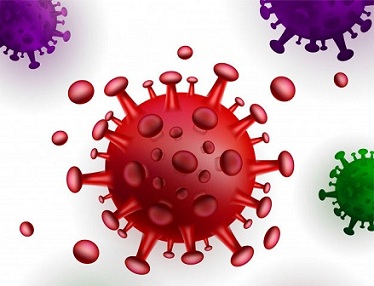As Predicted, First SARS-CoV-2 Reassortant Strain Emerges Involving The Recombination of Two Variants Resulting In A Heavily Mutated Coronavirus
Source: SARS-CoV-2 Reassortant Strains Feb 17, 2021 4 years, 11 months, 3 weeks, 10 hours, 58 minutes ago
SARS-CoV-2 Reassortant Strains: Since late 2020, Thailand Medical News has been predicting the emergence of reassortant strains during this COVID-19 pandemic in which the SARS-CoV-2 coronavirus might combine with other coronaviruses or even other viruses to produce a totally new strain with unique characteristics.

Such a
reassortant strain has finally emerged in Los Angeles although in this case, it is a little bit disappointing as it involves the recombination of two unique SARS-CoV-2 variants ie the UK variant B.1.1.7 recombining with the Californian variant known as B.1.429 resulting in an extremely potent heavily mutated coronavirus.
But readers need not worry as Thailand Medical News is working with researchers around the world and have already identified other more exciting reassortant strains involving humans contracting the SARS-CoV-2 virus but are also carrying other viral infections in their bodies and also in cases of animals possessing viral infections but still contracting the SARS-CoV-2 coronavirus from humans and then passing it back to other humans. We are in the process of detailed investigations and analysis which might take a couple of weeks before we make any announcements. But rest assured, it is going to be catastrophic especially in the Western countries like the United States and the United Kingdom that have been trying to control the narratives on the COVID-19 pandemic.
In this instance, the UK and California variants of the SARS-CoV-2 coronavirus appear to have combined into a heavily mutated hybrid, sparking concern that we may be entering a new phase of the COVID-19 pandemic
The two of concern variants of the SARS-CoV-2 coronavirus, each already with numerous unique mutations have combined their genomes to form a heavily mutated hybrid version of the virus.
This “recombination” event was discovered in a virus sample in California, provoking warnings and concerns that more potent SARS-CoV-2 coronavirus strains with unknown characteristics are heralding new phase of the pandemic.
This new hybrid virus is the result of recombination of the highly transmissible B.1.1.7 variant discovered in the UK and the B.1.429 variant that originated in California and which may be responsible for a recent wave of cases in Los Angeles because it carries a mutation making it resistant to some antibodies.
This new reassortant strain was discovered by Dr Bette Korber at the Los Alamos National Laboratory in New Mexico, who told a meeting organized by the New York Academy of Sciences that she had seen “pretty clear” evidence of it in her database of US viral genomes.
This recombinant strain would be the first to be detected in this pandemic. In December and January, two research groups independently reported that they hadn’t seen any evidence of recombination, even though it has long been expected as it is common in coronaviruses.
Alarmingly unlike regular mutation, where changes accumulate one at a time, which is how variants such as B.1.1.7 aros
e, recombination can bring together multiple mutations in one go.
In some cases such recombinant events do not confer any advantage to the virus, but in the case of coronaviruses, they do most of the time.
Such recombinations can be of major evolutionary importance, according to Dr François Balloux at University College London. It is considered by many to be how SARS-CoV-2 originated.
However recombination in most cases could lead to the emergence of new and even more dangerous variants, although it isn’t yet clear how much of a threat this first recombination event might pose.
Dr Korber has only seen a single recombinant genome among thousands of sequences and it isn’t clear whether the virus is being transmitted from person to person or is just a one-off. Investigations and studies are still underway.
Such recombinations commonly occurs in coronaviruses because the enzyme that replicates their genome is prone to slipping off the RNA strand it is copying and then rejoining where it left off. If a host cell contains two different coronavirus genomes, or even another virus genome, the enzyme can repeatedly jump from one to the other, combining different elements of each genome to create a ‘super’ hybrid virus.
Experts are warning that the recent emergence of multiple variants of the new coronavirus may have created the raw material for recombination because people can be infected with two different variants at once.
Dr Sergei Pond at Temple University in Pennsylvania, who keeps an eye out for recombinants by comparing thousands of genome sequences uploaded to databases told Thailand Medical News, “We may be getting to the point when this is happening at appreciable rates.”
Dr Pond warned that although there is still no evidence of widespread recombination, but that “coronaviruses all recombine, so it’s a question of when, not if”.
The detailed implications of the finding aren’t yet clear because very little is known about the recombinant’s biology. However, it does carry a mutation from B.1.1.7, called Δ69/70, which makes the UK virus more transmissible, and another from B.1.429, called L452R, which can confer resistance to antibodies.
Dr Korber warned at the New York meeting, “This kind of event could allow the SARS-CoV-2 virus to have coupled a more infectious virus with a more resistant virus. The emerging strains could be far more disastrous and difficult to manage”
Many experts and even Thailand Medical News believe that the COVID-19 pandemic is going to worsen in the coming months especially around May or July when a third wave of different proportions is expected to emerge.
For more on
SARS-CoV-2 Reassortant Strains, keep on logging to Thailand Medical News.
